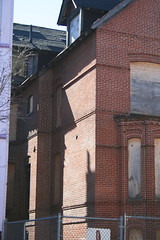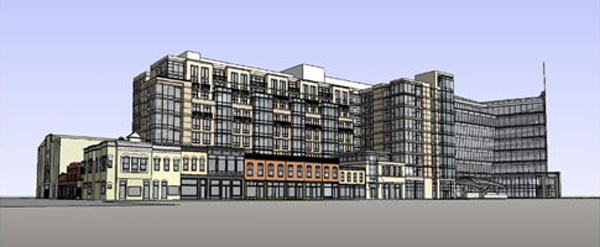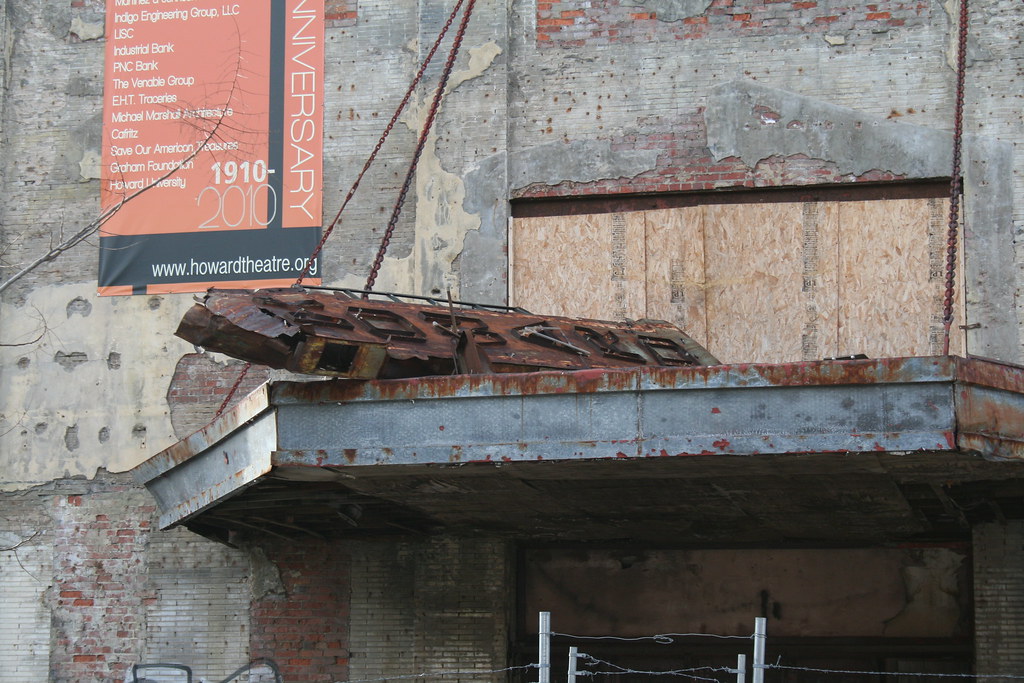Civic association conditions zoning support on vacancy
 At Tuesday night’s meeting of the LeDroit Park Civic Association, the association voted 11-2 to support the Howard University Campus Plan. Since several issues in the plan remain unresolved and unspecified, your author voted against supporting it.
At Tuesday night’s meeting of the LeDroit Park Civic Association, the association voted 11-2 to support the Howard University Campus Plan. Since several issues in the plan remain unresolved and unspecified, your author voted against supporting it.
Among many concerns are the several vacant properties that Howard University owns in the area. Though Howard has made a commendable effort to refurbish and sell many of these properties in LeDroit Park over the past decade, we are worried that the university, after it moves students out of Slowe and Carver Halls might leave these two dormitories vacant for several years.
The university has been very adept at finding excuses for keeping several of its properties vacant in decades past.
For current vagueness in the plan, university officials say they haven’t determined a use yet or that they haven’t found the financing or that everything is the economy’s fault.
That may be true, but vacant buildings attract trouble. They become safe-havens for criminals, vagrants, and rodents. Some vacant properties become truly blighted with windows covered up with plywood or metal covers. This blight drags down property values and lowers the quality of life.
For most private property owners, vacant properties (class 3) face a steep 5% annual property tax and blighted buildings (class 4) face a 10% annual property tax. These punitive tax rates are meant to urge owners of vacant and blighted properties to return their properties to good order and productive use.
As a university, however, Howard pays no taxes on its land, so a punitive 5% or 10% tax on $0 is still $0 . As such, the neighborhood needs a legal mechanism to ensure the university does not vacate Slowe and Carver Halls and then blame the economy as they board up the buildings for several years.
Whether the university keeps the buildings as student dorms or converts them to faculty housing is fine either way, but vacancy and blight threatens the progress the neighborhood has made over the past decade.
To prevent this, your author moved “To amend our support [for the campus plan] to prohibit vacancy of Slowe and Carver Halls for more than one year.”
The motion was property seconded and passed unanimously.
The civic association will submit this language to the Zoning Commission and urge the commission to attach it to the legally enforceable order that ratifies the campus plan. This will ensure that these two large dormitories do not sit vacant for an unreasonable length of time over the next decade.
Howard University’s campus plan is an ambitious and mostly good plan, but it’s important that point out its shortcomings and to ensure the university does not get away with undue burdens on neighborhoods and the District.
Exemption from property taxes is a privilege, not a right, and residents are wise to ensure this exemption is not abused to the detriment of the public interest.
Shaw Fits and Starts

Broadcast Center One as viewed from the CVS at 7th & T Streets
When climbing the escalator out of the Shaw Metro’s north entrance, one emerges between Seventh Street on the left and a vacant field on the right. The vacant field has been set for renewal with a plan going back several years. In January, when we first started writing about the project, Radio One was still planning to move its headquarters to the site and the United Negro College Fund (UNCF) was considering space there, too.
At the February ANC1B meeting, the development team’s lawyer stated that the combination of UNCF and Radio One would require a reduction in the number of apartments from 180 to 133. With Radio One unceremoniously backing out, the number is now restored to 180. In January, the amount of retail space was reported to be 22,000 square feet. Now that UNCF plans to occupy 5,000 square feet on the ground floor for an outreach center, the retail component may have changed.
Two weeks ago we reported that Radio One had snubbed Shaw and decided to stay put in Lanham, possibly putting the project in jeopardy. Luckily, UNCF, in offering to purchase half of the 100,000 square feet of office space, provides a sufficient commitment to get the project further financing.
The following table illustrates the changes in the project since the beginning of the year and reflects numbers gleaned from various sources.
| Radio One | Radio One + UNCF | UNCF | |
|---|---|---|---|
| Office Space (sq ft) | 96,000 | 160,000 | 100,000 |
| Housing units | 180 | 133 | 180 |
On Friday, the WBJ reported that UNCF’s chief had formally testified before the D.C. Council seeking a $3.8-million property tax break and a $710,000 grant to move to Shaw. LeDroit Park’s ANC commissioner Myla Moss (ANC1B01) testified in support of the legislation, which will be taken up by the full council in April. If approved, the development team promises (yet again) to break ground in August.
One casualty of the proposed move is the Howard Theater, already delayed and crumbling under the elements. The $710,000 relocation grant would come from money set aside for the theater’s revival.
Radio One Pulls Out; Shaw Metro Still Barren

Broadcast Center One as viewed from the CVS at 7th & T Streets
We reported a few days ago that the developer for Media Center One (a.k.a. Broadcast Center One), a mixed-use project slated for the area around the Shaw Metro, had inked a lease with the United Negro College Fund (UNCF). Good news for the long-delayed project.
Now the Washington Business Journal reports that the main tenant, Radio One, has inexplicably decided to stay put in the glitzy media town of Lanham, Maryland.
Though the development team says the project will go forward, we have trouble believing they can secure additional financing until they sign a replacement tenant.
At the previous ANC1B meeting, a lawyer representing the development group announced the group’s intention to convert 50,000 square feet of apartment space into office space. With Radio One out of the picture, perhaps they can revert the 50,000 square feet to apartments.
What’s most upsetting is that in January 2008, the District offered $23 million in subsidies to lure Radio One to the city. Two years and two months later, the land still sits vacant while Radio One just wasted two years of the taxpayers’ time.
We hope the developer finds a replacement soon, but unless the city is able to transfer the subsidy to another commercial enterprise, any struggling firm may balk at the District’s ridiculously high 9.975% corporate income tax rate— especially when Maryland and Virginia only charge 8.25% and 6.0%, respectively.
New Year, New Tax
Happy New Year!
Now pay up.
 Our city council and mayor, ever desperate for new sources of revenue, have levied, effective today, a five-cent tax on every paper and plastic bag. So unless you carry reusable bags in your pockets for every unforeseen trip to the store, get ready to shell out.
Our city council and mayor, ever desperate for new sources of revenue, have levied, effective today, a five-cent tax on every paper and plastic bag. So unless you carry reusable bags in your pockets for every unforeseen trip to the store, get ready to shell out.
The stated purpose of the tax is to clean up the Anacostia River and three or four cents of every nickle collected will go to the Anacostia River Protection Fund. Some stores have the option of offering a five-cent credit to customers who bring their own bags. In such cases, store owners will be allowed to keep two of the five cents of the tax they collect.
The bag tax applies to every store that sells food or alcohol. Since Best Buy sells candy near its check out lines, the tax applies there, too; you’d better take a reusable bag to carry your new DVD player home on the Metro.
Paper bags, which are biodegradable, are also taxed, not because of any potential impact on the Anacostia, but because of politics: store owners feared that a tax on plastic bags would encourage customers to opt for their more expensive paper counterparts.
For those who own cars (your author is not one of them), it might be easy to store one’s bags in the trunk and to pull them out at the store. The rest of us are expected to carry bags on our persons, which is a nuisance that the mayor, with his city-provided SUV, and the council, with their free street parking in front of the Wilson Building, probably don’t understand.
Our biggest complaint about this tax is not so much the money, but the degree of condescension it exudes, implying that those who use plastic bags are sinners destroying the Anacostia. Readers of this blog will note our distaste for litter, especially the heaps of it that pile up in front of the Howard Theater on the Block of Blight. It’s easy to levy a feel-good tax, whereas a sustained effort to fine people who litter and to sanction businesses whose customers litter isn’t nearly as sexy.
New Year, Newspeak
Adding to the condescension is the legislation’s wording, which refers to the tax by the more innocuous word fee, as though city residents are too stupid to identify a tax when they see it.
The District Department of the Environment, which is responsible for administering the new tax (oops, I mean “fee”) has jumped on the Orwellian bandwagon, too, refusing to use the word tax. Even worse, their campaign against plastic bags (see the image above) is an exemplar of newspeak, urging us to “skip the bag [to] save the river”. For those of use who don’t litter— the majority of District residents— to “skip the bag” will not “save the river” since we wouldn’t have littered anyway and by reusing other bags, we avoid paying the tax to finance the river clean-up. Ironically, by skipping the bag, we are not helping to save the river.
Cleaning up the river is a worthwhile goal, but levying yet another regressive excise tax wrapped heavily in moralistic rhetoric is neither honest nor fair. Financing river cleanup should come from proven sources of river pollution, including sewers (by taxing water bills), impervious real property (WASA already charges a fee for this), and by enforcing anti-littering laws more aggressively. Many of us, the majority I’d expect, use plastic bags and dispose of them responsibly so they don’t soil our communities and rivers. Nonetheless, we are the scapegoat pretext for this new tax.
We are willing to bet a shiny nickle that this latest feel-good tax will do little to curb littering and we expect the heaps of garbage to continue to pile up in front of the Howard Theater.
A Batty Bill

XI. Thou Shalt Not Choose Plastic.
Washington city-watcher (and occasion grumbler) Gary Imhoff publishes a twice-weekly e-newsletter on politics and life in the District. In Wednesday’s issue, Imhoff criticizes councilmembers who, though rightly keeping out of citizens’ bedrooms by planning to legalize same-sex marriage next month, “are now working their way through every other room in our houses, looking for ways in which they can regulate whatever we do.”
Nationally, some leaders have declared sugar a sin and want to tax it. Others want to ban incandescent bulbs in favor of compact fluorescent lights (which, by the way, happen to contain mercury).
Locally, the city council has condemned (via the tax code) plastic grocery bags as the latest fashionable sin du jour, assuming that we shoppers will discard the bags into the sewers.
As if that weren’t enough, Imhoff accuses Councilmember Mary Cheh (D – Ward 3) of introducing legislation, the so-called Wildlife Protection Act of 2009 (Bill 18-498), to solve a problem that, as Imhoff asserts, doesn’t exist:
[The bill] requires household exterminators, or “wildlife control operators,” to be licensed in the District; to follow the regulations in the bill; to prove that each animal they trap and relocate or, as a last resort, kill, is causing actual damage or danger; and to have a written plan for relocation of trapped animals approved by the District government for each job they do.
But certainly regulation is worthwhile if it saves animals from suffering, right? Well, a good philosopher will always question the very premise. Imhoff writes:
[T]here is no evidence that exterminators are currently engaged in any unnecessary animal cruelty. The bill was written at the behest of, and with the cooperation of, the Washington Humane Society (WHS), but all that the WHS can provide in support of it is speculation about possible harms, and no evidence of real harms. [We] spoke with two representatives of the WHS today. They both said that a[n] exterminator could set a foothold trap, or a bear trap, carelessly and harm a child or a household pet.
All right, [we] asked, how many children in the District have been wounded by a bear trap in the last five years?
They didn’t know of any.
How many pets have been wounded by a foothold trap?
They didn’t know of any; they didn’t keep records of any instances.
But a careless exterminator could leave an animal in a trap for days, to die painfully. How many instances of that happening could the WHS document?
Well, none, but it could happen.
What about the provision that forbids moving, trapping, or killing bats nesting in a house for six months of every year? The WHS didn’t know anything about that, but I wonder exactly what the Health Department or the Department of Consumer and Regulatory Affairs or the Department of Housing thinks about the advisability and desirability of humans sharing their houses with bats.
From what we read, Ms. Cheh’s bill may cause more trouble than it solves. If a property owner discovers bats in the attic, “A wildlife control operator shall remove bats only by nonlethal exclusion, prior to hibernation, except when health department requires lethal removal.”
So if they’re hibernating, you’ll have to wait until they leave hibernation or until the Health Department sends a threatening notice.
While animal cruelty is certainly abhorrent, Ms. Cheh’s bill addresses a problem that we are not convinced exists in the first place: that pest exterminators are needlessly torturing pests or that wayward children are wandering into bear traps.
Exterminators are already accountable by civil law and the fear of liability suits. Exterminators are also likely to want to avoid the displeasure of customers who want swift catching and removal of pests as opposed to slow and painful removal.
We concede that cases will slip by, but in this instance Ms. Cheh exhibits a worrying belief that it is the role of the city council to legislate every potential or actual wrinkle out of modern life.
Fretting over bats is a luxury we’re sure that Ward 3 can afford, but we would rather see the council expend its legislative energy reducing the cruel and inhumane destruction of human life that occurs far too frequently in the rest of the city.








Recent Comments